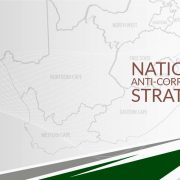|
Getting your Trinity Audio player ready...
|
Corruption Watch today announces its plan to contribute to the National Anti-Corruption Strategy (NACS), a document initiated by the Anti-Corruption Inter-Ministerial Committee (ACIMC) established in 2014. The organisation will focus its activities on creating avenues for public engagement and consultation on the draft document, targeting the general public, civil society and the private sector for their inputs, beginning with the survey launched today.
The NACS is a document intended to serve as a guide to government, business and civil society to coordinate and support efforts to reduce corruption in South Africa. Its creation was informed by several processes commissioned by the steering committee to develop a resilient anti-corruption system that is robust and has the buy-in of all sectors.
The ACIMC finally released a draft document for public discussion in May 2017, and as of May 2018, the Department of Performance Monitoring and Evaluation (DPME) has been undertaking public engagement at national and provincial level, which constitutes phase two of the NACS roadmap.
The survey released today intends to inform and solicit opinions from the public about the strategy, and encourage them to contribute to the process. These inputs will form part of Corruption Watch’s public submission to the DPME by the end of July 2018, based on evidence collected from the public, civil society and private sector stakeholders, to ensure their incorporation into the final NACS. Further inputs will be solicited from anti-corruption experts, both regional and international, to provide feedback on the nine pillars of the NACS, and to ensure alignment with global best practice.
The core focus of the NACS is the identification of those nine pillars, which form the basis of all activities aimed at reducing corruption. In summary, they are:
- Citizen empowerment in the fight against corruption;
- Sustainable partnerships with stakeholders to reduce corruption;
- Improved transparency by government, business and civil society;
- Improved integrity of the public procurement system;
- The professionalisation of employees;
- Improved adherence to integrity management, anti-corruption mechanism and consequence management for non-compliance;
- Strengthened oversight and governance mechanisms in government;
- Strengthened resourcing, co-operation and independence of dedicated anti-corruption agencies;
- Establishment of specific programmes to reduce corruption and improve integrity in vulnerable sectors (justice, crime prevention and security cluster).
David Lewis, executive director of Corruption Watch, commented: “The public consultation process is intended to refine the contents of the strategy and to secure public buy-in. While we will attempt to advance these goals, it is critically important that there is buy-in at the top levels of government.”
South Africans are weary of grand strategies that are not implemented, Lewis said.
“We would like President Ramaphosa lead this public conversation and accept accountability for the implementation of the strategy.”
For information, contact:
Phemelo Khaas 083 763 3472 PhemeloK@corruptionwatch.org.za






